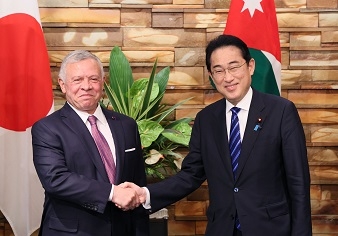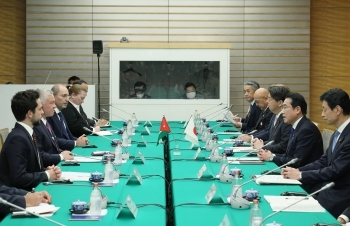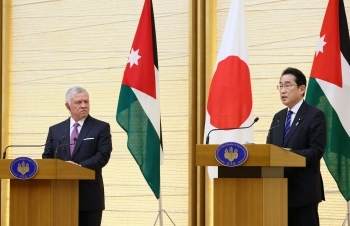Japan-Jordan Relations
Japan-Jordan Summit Meeting and Working Dinner
 (Photo: Cabinet Public Affairs Office)
(Photo: Cabinet Public Affairs Office)
 (Photo: Cabinet Public Affairs Office)
(Photo: Cabinet Public Affairs Office)
 (Photo: Cabinet Public Affairs Office)
(Photo: Cabinet Public Affairs Office)
On April 11, commencing at 6:00 p.m. for approximately 30 minutes, Mr. KISHIDA Fumio, Prime Minister of Japan, held a Summit Meeting with His Majesty King Abdullah II Ibn Al Hussein, King of the Hashemite Kingdom of Jordan, who was on an official visit to Japan, followed by an exchange of notes regarding grant aid for the “Economic and Social Development Programme” in the presence of the two leaders. After a joint press conference, Prime Minister Kishida hosted a working dinner, which started at 6:55 p.m. and lasted approximately 65 minutes. The overview is as follows.
1. Introduction
Prime Minister Kishida welcomed the visit to Japan by King Abdullah II and Queen Rania and expressed his respect for the leadership of King Abdullah II in leading the stability and development of Jordan. Prime Minister Kishida also expressed his desire to take advantage of such an opportunity to further advance the strategic partnership between Japan and Jordan as the two countries will mark the 70th anniversary of establishing diplomatic relations in 2024.
In response, King Abdullah II expressed his pleasure at visiting Japan again and appreciation for the warm reception extended by the Japanese side, as well as his desire to further strengthen strategic relations rooted in history and tradition to elevate the bilateral relations.
2. Bilateral relations
The two leaders discussed a wide range of bilateral issues, including the following items, and agreed to deepen bilateral relations going forward, while further expanding the scope of cooperation under the strategic partnership.
(1) Economic cooperation and others
Prime Minister Kishida stated that Japan appreciates Jordan’s efforts to modernize its economy and finances, and will continue to support Jordan through measures including development policy loans and grant aid for the electricity, water and other sectors, which lay the foundation of its economy. Prime Minister Kishida also expressed Japan’s desire to contribute to the urgent challenges facing Jordan, such as increasing investment from abroad and reducing unemployment primarily among younger generations, and explained Japan’s support for Jordan in accepting many refugees. In response, King Abdullah II expressed deep appreciation for Japan’s consistent support for Jordan.
The two leaders also agreed to promote cooperation in the field of advanced technology including digital, as well as other fields such as supply chains.
(2) Security
The two leaders shared recognition regarding the progress made in bilateral cooperation on the security front. Prime Minister Kishida touched on the Fourth Japan-Jordan Politico-Military (PM) Dialogue that took place in December last year and various exchanges between defense forces of both countries, and expressed Japan’s desire to further contribute to the peace and stability of the international community on the basis of the new National Security Strategy and other documents formed in December last year. Prime Minister also expressed Japan’s desire to deepen cooperation with Jordan going forward through various frameworks. In response, King Abdullah II expressed his hope that the bilateral security cooperation will be further deepened going forward.
In addition, the two leaders welcomed that the two countries concurred on launching a bilateral dialogue framework on cybersecurity.
3. Regional affairs
Regarding Russia’s aggression against Ukraine, Prime Minister Kishida referred to his visit to Ukraine in March this year and stated the need for the international community to stay united in making the case that any unilateral change of the status quo by force is unacceptable anywhere in the world. The two leaders concurred to continue to work together as partners in upfolding the international order.
In addition, Prime Minister Kishida introduced the New Plan for a “Free and Open Indo-Pacific (FOIP)” announced in March this year, and expressed his desire to continue to spread the importance of the FOIP vision in the Middle East region while cooperating with Jordan. In response, King Abdullah II expressed his support for the rules-based international order as well as efforts to ensure stability, security and prosperity of the Indo-Pacific region. The two leaders agreed to closely cooperate in maintaining and strengthening the free and open international order based on the rule of law toward realization of the peace and stability of the region and international community.
The two leaders also discussed regional affairs in the Middle East region, including the peace in the Middle East. Prime Minister Kishida expressed his concern over the current highly tense situation between Israel and Palestine, and highly appreciated the efforts made by the five-party talks (Jordan, Egypt, the United States, Israel, and Palestine) to reduce tensions. Prime Minister Kishida also stated that the role ofJordan and the Hashemite Custodianship over the holy sites in Jerusalem, is extremely important, and that Japan will also play its role by promoting its own initiatives, such as the “Corridor for Peace and Prosperity.” In response, King Abdullah II explained Jordan’s efforts to prevent the aggravation of the situation in Palestine and to find a political horizon for the resumption of earnest negotiations toward the realization of a just and lasting peace based on a two-state solution. The two leaders confirmed the need for restraint against any unilateral action that would prevent the realization of a “two-state solution” with a view to preventing further escalation of the current tensions between Israel and the Palestine. The two leaders also exchanged views on the regional affairs, including those in Iraq and Syria, and confirmed that they will continue to work together toward the stability of the region.
The two leaders also exchanged views on the situations in East Asia, including those regarding China and North Korea, and concurred on continued close cooperation in dealing with issues such as North Korea including the abductions issue.
4. Others
After the Summit Meeting, the two leaders witnessed the signing ceremony of the grant aid of 713 million yen from Japan to Jordan for the “Economic and Social Development Programme” (provision of equipment for the facilities to be built under the Aqaba Amman Water Desalination and Conveyance Project)

